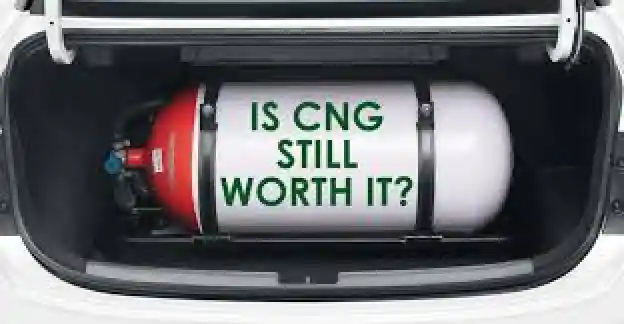Should You Convert Your Car to CNG in Nigeria? Pros, Cons & 2025 Guide.
With rising fuel costs hitting Nigerian households hard, many motorists are now asking an important question: Should I convert my car to CNG (Compressed Natural Gas)? In recent months, the Federal Government of Nigeria has intensified efforts to promote CNG conversion as a sustainable alternative to petrol.
TJ News Nigeria reports that the Presidential CNG Initiative (PCNGI) is gaining traction, with several accredited CNG conversion centres operational across major Nigerian cities. But despite the promise of lower fuel costs, many Nigerians remain unsure about the practical implications of converting their petrol or diesel cars to CNG.
In this detailed guide, we explain how CNG works, the cost of CNG conversion in Nigeria in 2025, its advantages and disadvantages, and where to find FG-approved conversion centres.
What is CNG and How Does It Work?
Compressed Natural Gas (CNG) is a fuel made from natural gas that has been compressed to less than 1% of its volume at standard atmospheric pressure. It is used as an alternative to petrol or diesel in internal combustion engines, with dedicated kits installed to enable vehicles to run on this cleaner energy source.
Why Nigerians Are Considering CNG:
- CNG Price in Nigeria (2025): Around ₦230 per standard cubic metre, while petrol sells for ₦1,000+ per litre.
- Local Production: Nigeria has abundant natural gas reserves, reducing dependence on imported fuel.
- Cleaner Combustion: Reduces carbon buildup, protecting engines and improving lifespan.
Benefits of Converting Your Car to CNG in Nigeria
If you’re considering switching to CNG, here’s why many Nigerians are taking that route:
???? 1. Fuel Cost Savings
Switching to CNG can reduce your fuel expenses by up to 40%. For example, drivers spending ₦100,000 on petrol monthly may spend closer to ₦60,000 on CNG for the same mileage.
???? 2. Environmental Benefits
CNG burns cleaner than petrol, producing fewer pollutants like carbon monoxide (CO) and nitrogen oxides (NOx). It’s a step toward cleaner air in Nigeria’s urban centres.
???? 3. Engine Longevity
CNG combustion results in less carbon buildup, meaning spark plugs, engine valves, and oil last longer than in petrol engines.
???? 4. Federal Government Incentives
The FG offers conversion subsidies, particularly for commercial transporters, reducing upfront conversion costs by as much as 50%.
Drawbacks and Risks of CNG Conversion in Nigeria
Despite its benefits, CNG conversion isn’t suitable for everyone. Here’s what you should consider before making the switch:
1. Upfront Conversion Costs
The conversion isn’t cheap:
- 4-cylinder vehicles: ₦1.3 million
- 6-cylinder: ₦1.5 million
- 8-cylinder: ₦1.75 million+
Even with FG subsidies, private car owners will bear between ₦700,000 – ₦900,000 out of pocket.
2. Limited Infrastructure
As of 2025, Nigeria has fewer than 20 accredited CNG refuelling stations. Lagos, Abuja, Ogun, and Kaduna have the majority of available stations.
3. Space Consumption
CNG tanks take up significant boot/trunk space, reducing storage for luggage.
4. Safety Concerns
While CNG systems are generally safe, improper installations or tampered cylinders can pose fire risks. Always use FG-approved installers.
Step-by-Step: How to Convert Your Car to CNG in Nigeria
If you decide to proceed with a CNG conversion, follow these recommended steps:
- Check Vehicle Eligibility: Cars in good mechanical condition with a healthy engine are ideal for conversion.
- Visit an Approved Centre: Use only FG-accredited locations for installation.
- Undergo Pre-Conversion Inspection: Technicians will examine your car’s compatibility.
- Install the Conversion Kit: Includes tanks, regulators, injectors, hoses, and dashboard switches.
- Conduct Safety Testing: Ensure there are no leaks or installation errors.
- Register Your Vehicle as Bi-Fuel: Notify relevant road agencies that your car now runs on both CNG and petrol.
- Regular Maintenance: Schedule periodic checks of CNG components for safety.
Top FG-Approved CNG Conversion Centres in Nigeria (2025)
According to recent data gathered by TJ News Nigeria, here are some of the key accredited CNG conversion centres in Nigeria:
Lagos:
- Femadec Energy, Lekki-Epe Expressway
- Portland Gas, Ojota
- Mezovest Nigeria, Ajah
- Dana Motors, Isolo
- MBH Power, Ikorodu
- Autogig, Gbagada
Other Cities:
- Abeokuta & Ibadan: Pilot programs active since late 2024.
- Abuja: Portland Gas facilities operational.
- Kaduna: Northern CNG hubs established through the PCNGI initiative.
By mid-2025, the Federal Government aims to increase the number of operational conversion centres across Nigeria to 30+.
CNG Conversion Costs in Nigeria (2025 Breakdown)
| Engine Type | Estimated Conversion Cost |
|---|---|
| 4-cylinder | ₦1.3 million |
| 6-cylinder | ₦1.5 million |
| 8-cylinder | ₦1.75 million |
Government Subsidies for Transporters: ₦600,000 – ₦750,000 reduction on total costs for qualified commercial drivers and fleet operators.
FAQs: What Nigerians Want to Know About CNG
Is CNG Suitable for My Car?
If your car has a solid engine with no major mechanical faults, it is likely suitable. Consult with a certified technician.
Can I Still Use Petrol After Conversion?
Yes. CNG conversions in Nigeria typically result in bi-fuel vehicles, meaning you can switch between petrol and CNG as needed.
What Happens to My Car Insurance After Conversion?
Inform your insurance provider after conversion. Some insurers may adjust premiums slightly, but many already accommodate CNG conversions.
Related Resources for Smart Nigerian Drivers
- How to Lower Cholesterol Naturally: Nigerian Diet and Exercise Tips
- How to Get a Police Tinted Glass Permit in Nigeria
- Documents to Collect When Buying a Tokunbo (Used) Car in Nigeria
Conclusion
CNG represents a serious opportunity to cut fuel costs in Nigeria, especially as petrol prices continue to rise. TJ News Nigeria learnt that for transporters, long-distance drivers, and residents of cities with active CNG infrastructure, converting to CNG could pay off within 2–3 years.
However, success depends on:
- Proximity to CNG stations
- Availability of FG-approved conversion centres
- Ability to cover upfront installation costs
As Nigeria’s CNG infrastructure grows, more motorists are expected to embrace this cleaner, cheaper fuel option. Those who make the switch now stand to save considerably on long-term fuel expenses.






